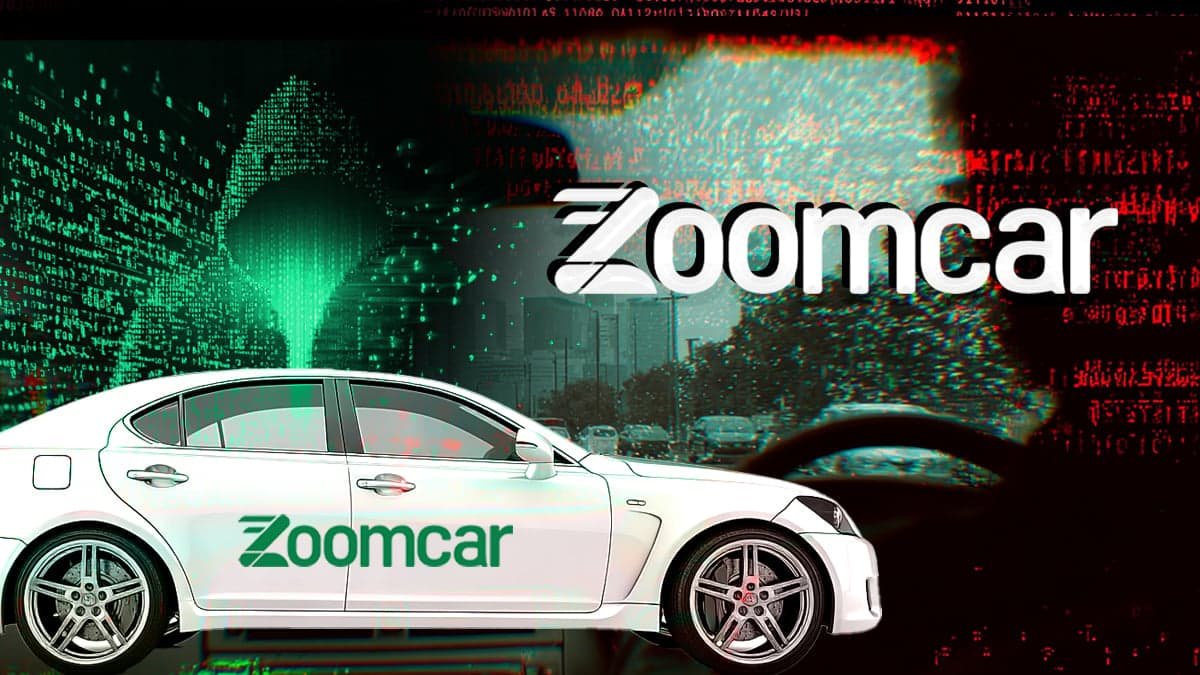Summary :
- Zoomcar confirms that personal data of 8.4 million users was compromised in a recent cyberattack.
- Leaked information includes names, emails, phone numbers, and car registration details—but not passwords or payment data.
- This is Zoomcar’s second major data breach in seven years, prompting questions about data security in India’s mobility tech sector.
- Affected users have not yet been individually notified, though the company filed a disclosure with the U.S. Securities and Exchange Commission (SEC).
- The breach offers a case study in the growing vulnerability of tech-enabled consumer services in India’s digital economy.
For 27-year-old Arpita Singh, a tech consultant in Pune, Zoomcar wasn’t just a convenience—it was her go-to for weekend getaways, long drives to Mahabaleshwar, and even the occasional grocery run during lockdown days. Last week, she received a phishing email referencing the make and model of her last booking.
“I knew something was wrong,” she says. “Only Zoomcar had that combination of details—my number, my address, my car history. I trusted them. That trust feels broken now.”
She’s one of the 8.4 million users whose personal information was accessed by hackers in a breach Zoomcar detected on June 9, confirmed in a filing to the U.S. SEC on June 13. The stolen data includes full names, phone numbers, email IDs, physical addresses, and vehicle registration numbers—enough to build sophisticated social engineering attacks.
Behind the Hack: Detection, Disclosure, and Delay
The first signs of the breach appeared when employees received anonymous tips about internal data being leaked. Zoomcar’s security systems flagged abnormal activity in its infrastructure shortly after. By the time external consultants were called in, the damage was done.
Zoomcar, now a publicly listed company on the Nasdaq (ZCAR), moved swiftly to comply with international disclosure laws—yet critics argue that users were left in the dark for too long. No push notifications, no public customer advisory—just a regulatory note for investors.
“We are working with cybersecurity experts to investigate and contain the incident,” Zoomcar said in a statement. “To date, there is no evidence of misuse of passwords or financial information.” But for many, that’s cold comfort.
A Pattern Repeats: Zoomcar’s History of Digital Fragility
This isn’t Zoomcar’s first brush with cybercrime. In 2018, over 3.5 million user records were leaked—many of them, including hashed passwords, later appeared for sale on the dark web. Despite that breach, no visible overhaul of its cybersecurity apparatus was made public.
In the years since, the company has expanded aggressively, rolling out in Southeast Asia and the Middle East. But its internal security, according to experts, hasn’t scaled with its ambition.
“Mobility tech startups are sitting on a goldmine of user data—location, driving history, payments,” says cybersecurity analyst Ramesh Rawat. “And yet, their investment in digital safety rarely matches the sensitivity of that data.”
Industry Wake-Up Call: Digital Mobility’s Invisible Risk
Zoomcar is not alone. Ride-hailing and self-drive platforms have increasingly become targets for cyberattacks. From Ola’s data leak in 2022 to Uber India’s ransomware scare in 2024, the industry’s digital underbelly is often underregulated and underdefended.
In a market where convenience trumps caution, users sign up with little awareness of how their data is stored, transferred, or protected.
“This breach is a red flag for India’s digital infrastructure,” says Priya Natarajan, a data privacy advocate. “What we need is not just better laws—but public awareness, audit culture, and accountability.”
A Teachable Moment: Ravi’s Case
Consider Ravi Mehra, a 34-year-old MBA student from Hyderabad. He used Zoomcar during a business trip and later got an email from a fraudster posing as customer support. “The email used my name, car type, and even the city. It felt real. I nearly clicked on the link,” he recalls.
His caution saved him—but not everyone may be so lucky.
The breach, while not involving passwords or payments, shows how personal data alone is enough to orchestrate sophisticated fraud. As Zoomcar works on forensic analysis and damage control, users like Ravi are left wondering whether their loyalty has left them exposed.
A Breach Beyond Bytes
What makes the Zoomcar breach resonate is not just its scale—but its emotional and cultural breach of trust. In a country rapidly digitizing mobility, healthcare, and banking, personal data is the currency of convenience—and its theft can be more personal than ever.
Zoomcar may fix its firewalls, but regaining customer confidence will take much more than software patches.



